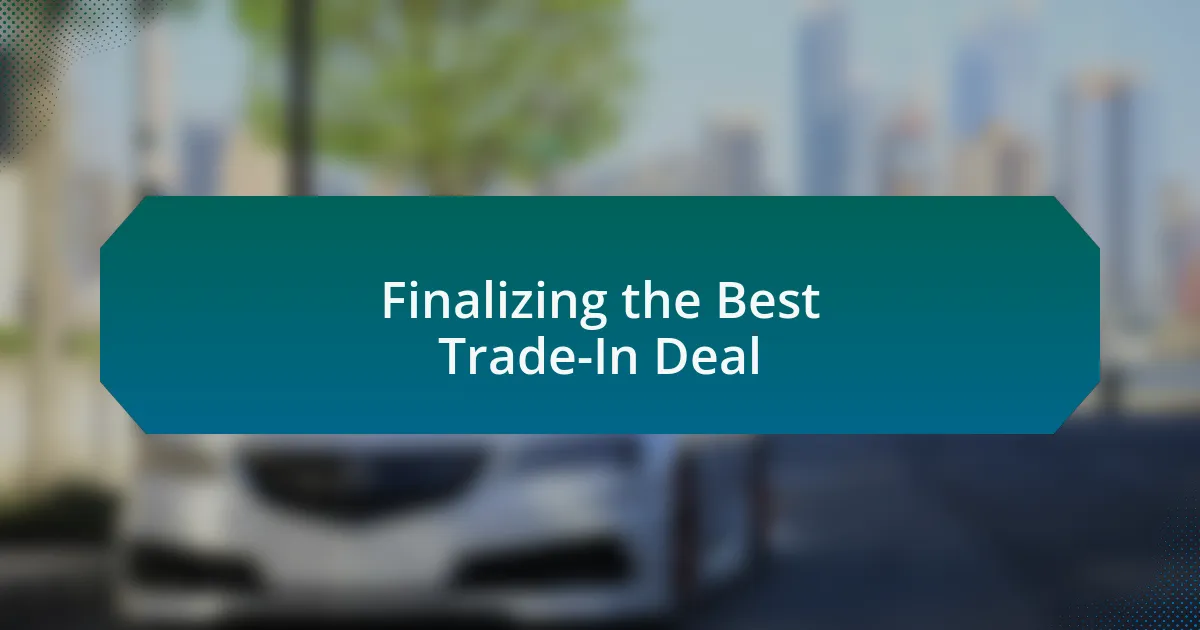Key takeaways:
- Researching your vehicle’s condition, market demand, and timing significantly impacts trade-in value.
- Negotiating offers confidently and with knowledge enhances your position as a seller.
- Unique features, service history, and emotional connections can elevate trade-in offers.
- Effective communication and strategic timing during final negotiations can lead to better deals.

Overview of Trade-In Offers
Trade-in offers can seem a bit overwhelming at first, but understanding them can lead to significant savings. I remember feeling a mix of excitement and uncertainty when I first traded in my car. How much is my vehicle really worth? This question often lingers in the minds of many, and it’s important to do your research beforehand.
The value of a trade-in is not just a number; it’s a reflection of the vehicle’s condition, mileage, and market demand. I once underestimated the impact of a clean interior and regular maintenance on my trade-in value. When I finally took the time to spruce it up before the appraisal, it felt rewarding to see how much more I could get.
Negotiating trade-in offers requires confidence and knowledge. Have you ever felt hesitant to negotiate? I used to shy away from it, but learning to articulate the value of my car empowered me during the discussions. After all, it’s not just about getting a fair deal; it’s about ensuring that you’re recognized for the value you bring to the table.

Importance of Evaluating Offers
Evaluating trade-in offers is crucial because it ensures you receive a fair value for your vehicle. I vividly remember a time when I rushed through the evaluation process, only to discover later that I could have secured several thousand dollars more if I had put in a little extra effort. It made me realize that each moment spent researching can significantly impact my financial outcome.
It’s also about understanding your vehicle’s worth in the current market. Did you know that certain times of the year can influence trade-in values? I once traded a car just as the season shifted toward summer; that decision resulted in a notably higher offer simply because demand was peaking. This taught me that timing can be just as vital as the condition of the car itself.
Moreover, carefully evaluating offers allows you to negotiate effectively. I’ve found that when I have solid knowledge and clear expectations, it not only builds my confidence but also positions me as a more informed seller in the eyes of potential buyers or dealerships. Have you ever stepped into negotiations feeling unprepared? In my experience, coming armed with facts and data can turn the tables in your favor.

Key Factors in Trade-In Evaluation
When it comes to evaluating trade-in offers, vehicle condition is one of the most significant factors. A few years back, I decided to trade in an SUV that had its fair share of wear and tear—there was a dent on the side and the interior had seen better days. I hadn’t invested any time in repairs before the appraisal, and as a result, the offer reflected that neglect. It was a painful lesson, underscoring how keeping up with maintenance can truly make a difference in resale value.
Another key factor is market demand for your specific make and model. I once had a friend who was shocked to learn that her luxury sedan was in high demand for used buyers. She was initially planning to trade it in without much thought, but after a quick look at online listings and local demand, she decided to hold off. That insight enabled her to maximize her trade-in value more than she ever expected. Have you ever considered how the popularity of your car could directly impact your trade-in offer?
Finally, mileage plays a crucial role in determining a vehicle’s trade-in value. In my own experience, when I lowered the mileage on my vehicle because I was using public transport for a brief period, the dealer expressed significant interest when I finally decided to trade it. I realized that every mile counts—not just in terms of wear—but also in the impression it leaves on buyers. So, have you kept track of your vehicle’s mileage trends? Understanding how this can serve as leverage in negotiations can be quite empowering.

Analyzing Luxury Car Value
When it comes to luxury cars, the brand and model can significantly influence value. I remember when I was eyeing a high-end sports coupe; the dealer emphasized its exclusivity and history, which made me realize how certain models can carry a premium just based on their reputation. This made me wonder: have you ever considered how a brand’s legacy can affect your car’s worth? Understanding that connection can be a game-changer during trade-in negotiations.
Another crucial aspect is the vehicle’s service history. I once traded in a luxury SUV that had a spotless service record, and it felt like having a golden ticket during negotiations. The dealer was impressed, and it boosted my trade-in value considerably. It’s fascinating how documentation of regular maintenance can elevate perceived value. Are you keeping all your service records handy?
Lastly, the surrounding economic climate can also sway luxury car values. I vividly recall the economic downturn, where dealers were more cautious about offers. However, when the market rebounded, I was pleasantly surprised by how much more my vehicle was worth. Do you track economic trends and how they influence car values? Being informed could open doors to a better deal for you when the time comes to trade in.

My Personal Evaluation Strategy
When I evaluate trade-in offers, I always start by scrutinizing the market trends for my specific model. I recall a time when I almost let a generous offer slip away because I wasn’t aware of a recent surge in demand for my car. Have you ever missed out on a better deal simply because you didn’t do your homework? I’ve learned that a little research can make a world of difference.
Next, I consider any unique features or aftermarket modifications that could enhance my vehicle’s appeal. For instance, when I traded a coupe with a custom exhaust and upgraded sound system, I was surprised at how much the dealer appreciated those enhancements. It made me think: are you maximizing the potential of your car’s unique traits in your negotiations? Every bit counts in luxury car evaluation.
Finally, I don’t shy away from emotional attachments that could give my car a nostalgic edge. I once had a luxury sedan that my family and I made countless memories in, and sharing that story during negotiations added a personal touch. This approach often resonates more with buyers. Have you thought about what your car means to you and how that can influence its value? Emphasizing those memories can sometimes elevate the offer in unexpected ways.

Finalizing the Best Trade-In Deal
As I move toward finalizing a trade-in deal, I find that timing can be crucial. For example, I once waited until the beginning of the month to close a deal because dealerships often have sales targets to meet. This strategic timing resulted in a better offer, proving that patience and awareness of the sales cycle can play in your favor. Have you ever thought about how timing might impact the negotiations you engage in?
Moreover, I always keep an open line of communication with the dealer during the finalization. When I sold my convertible, I made sure to ask questions like, “What can you do to make this offer appealing for both of us?” It opened up a dialogue that revealed options I hadn’t considered. Engaging with the dealer on a personal level can often lead to unexpected perks or enhancements in the deal.
Lastly, before I wrap up, I conduct a quick mental checklist of all the offers I’ve received. In one instance, I had three different quotes, and by weighing the pros and cons of each, I picked the one that not only offered the highest value but also felt right for my circumstances. It reinforces a vital lesson: being informed and reflective during the final stages can significantly influence the outcome. Are you taking the time to evaluate all your options before making that final leap?